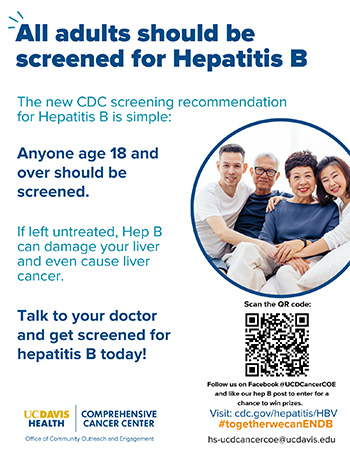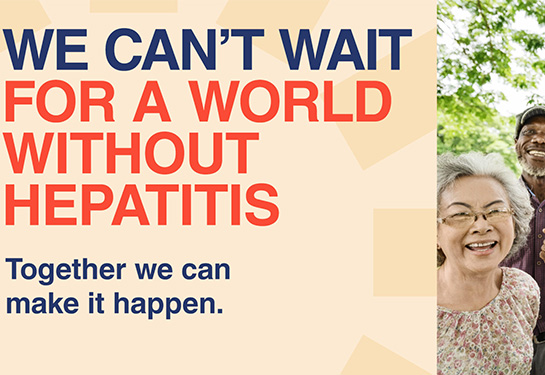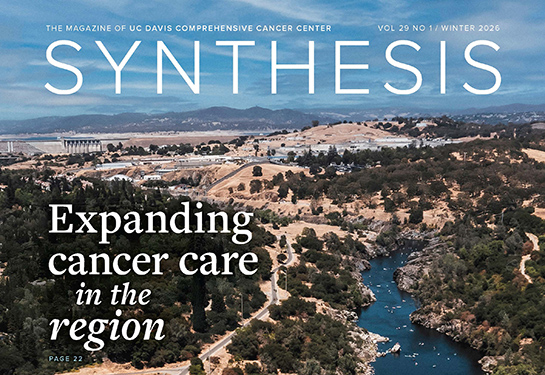Today is World Hepatitis Day
The cancer center is spreading awareness about new CDC guidelines that urge everyone over 18 to be screened for hepatitis B
UC Davis Comprehensive Cancer Center is using World Hepatitis Day to bring attention to newly updated guidelines about who should be screened for hepatitis B (HBV), the most common cause of liver cancer worldwide.
The new Centers for Disease Control and Prevention (CDC) recommendation is simple: Anyone age 18 and over should be screened for HBV at least once in their lifetime.

The cancer center’s Office of Community Outreach and Engagement (COE) launched a social media campaign today to mark World Hepatitis Day with the goal of raising awareness about the CDC’s latest recommendation. The END B program is funded by a $1.5 million grant from the Office of Minority Health in the U.S. Dept of Health & Human Services.
“If undiagnosed, Hepatitis B can lead to liver damage, and even cause liver cancer. Most people living with hepatitis B have no symptoms, so it is important to get screened,” said UC Davis hepatologist Eric Wai Chak, who specializes in liver cancer.
Spreading the word
The END B campaign includes print and radio ads in multiple languages (Chinese, Hmong, Punjabi, Spanish, Thai, and Vietnamese) with a universal screening message. The campaign also includes social media, with giveaways and raffle prizes for people who follow the COE Facebook page and click “like” on the HBV posts.
Multilingual posters and flyers are also being distributed to federally qualified health centers, community clinics and student-run clinics in the Sacramento area and other parts of the region served by the cancer center, extending to Merced and the Central Valley.
According to the CDC, two-thirds of Americans with HBV do not even know they are infected. Prior to the new guidelines, doctors tested people for HBV based on where they were born or where their parents were born as well as other risk factors. But now, universal screening means that everyone, no matter where they were born, should be screened for the virus.
What is World Hepatitis Day?
World Hepatitis Day is recognized annually on July 28, the birthday of Baruch Blumberg (1925–2011). Blumberg discovered the hepatitis B virus in 1967, and two years later he developed the first hepatitis B vaccine. These achievements culminated in Blumberg winning the Nobel Prize in Physiology or Medicine in 1976.
Organizations around the world, including the World Health Organization and CDC commemorate the day to raise awareness about viral hepatitis, which impacts more than 354 million people worldwide. World Hepatitis Day creates an opportunity to educate people about the burden of these infections, the CDC’s efforts to combat viral hepatitis around the world, and actions people can take to prevent these infections.
“If we find out early that someone has chronic hepatitis B, we can start treating them and reduce the chances of developing severe and life-threatening liver problems,” Chak said.
UC Davis Comprehensive Cancer Center
UC Davis Comprehensive Cancer Center is the only National Cancer Institute-designated center serving the Central Valley and inland Northern California, a region of more than 6 million people. Its specialists provide compassionate, comprehensive care for more than 100,000 adults and children every year and access to more than 200 active clinical trials at any given time. Its innovative research program engages more than 240 scientists at UC Davis who work collaboratively to advance discovery of new tools to diagnose and treat cancer. Patients have access to leading-edge care, including immunotherapy and other targeted treatments. Its Office of Community Outreach and Engagement addresses disparities in cancer outcomes across diverse populations, and the cancer center provides comprehensive education and workforce development programs for the next generation of clinicians and scientists. For more information, visit cancer.ucdavis.edu.




